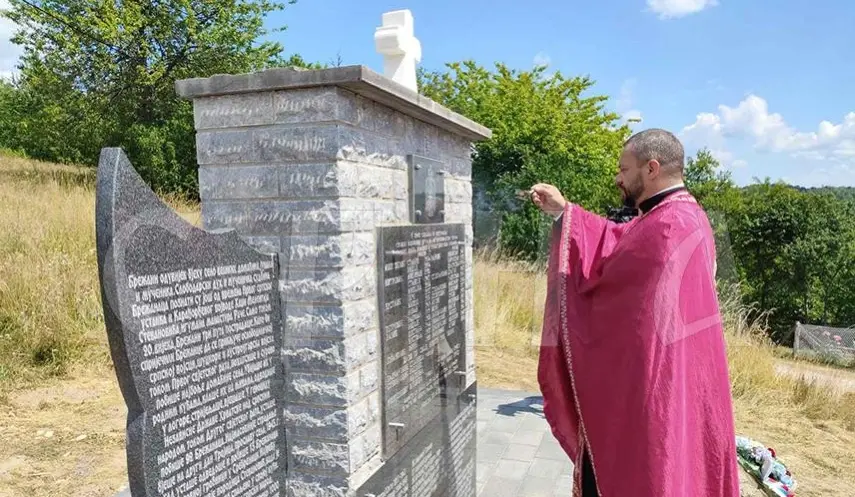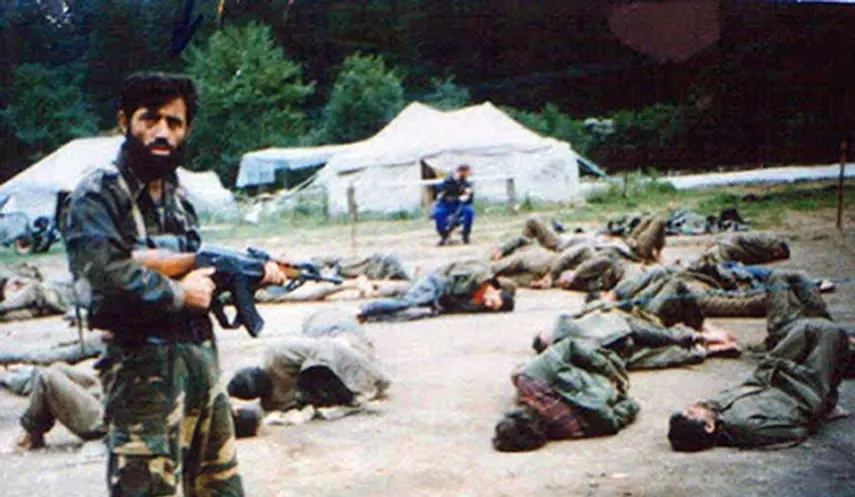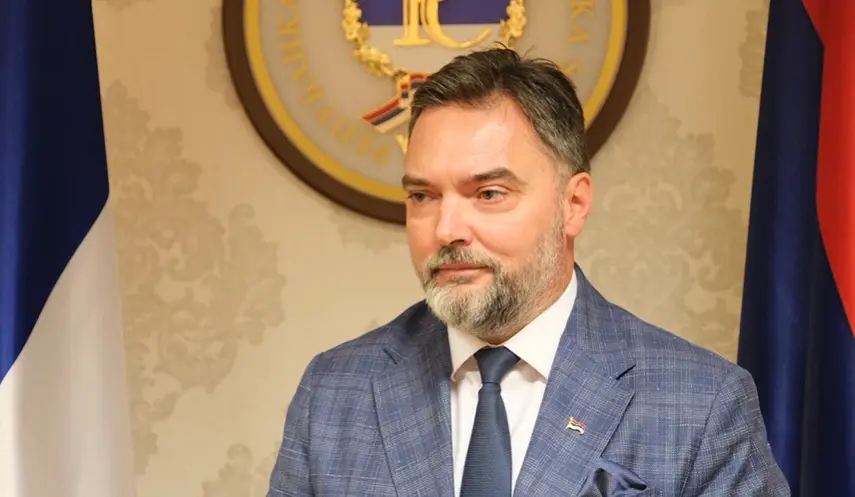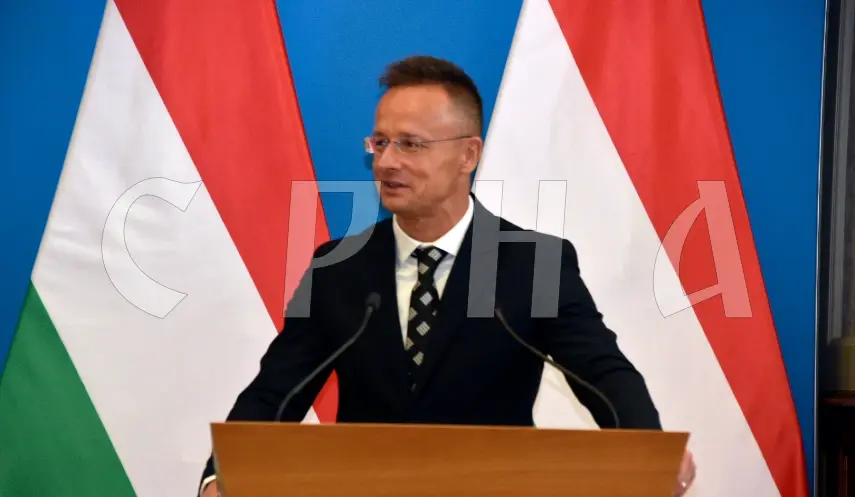MEMORIAL SERVICE HELD IN BREŽANI FOR VILLAGERS KILLED 33 YEARS AGO
Republika Srpska - Srebrenica - culture of memory
06/30/2025
14:27

SREBRENICA, JUNE 30 /SRNA/ – A memorial service was held today in the village of Brežani near Srebrenica for 32 villagers, 18 of whom were killed on this day 33 years ago by Muslim forces from Srebrenica and surrounding villages.
The service was also held for 92 Serbs from Brežani who were killed in World War II and an undetermined number of those executed in the Great War, victims of the same enemy – Muslim neighbors and their descendants.
The memorial service was conducted by Srebrenica priest Aleksandar Mlađenović at the monument erected for the victims of the last war in BiH. Next to it are two plaque wings describing the genocide committed against Serbs from this village in three wars of the 20th century, with inscribed names of those killed in World War II.
Candles were lit for the souls of the fallen Serb civilians and soldiers, and flowers were laid at the memorial, which was erected after the war in remembrance of those killed.
Flowers were laid by delegations from the Srebrenica municipality, the Veterans’ Organisation, and the Organisation of Families of Captured and Killed Soldiers and Missing Civilians of this municipality.
Brežani is one of a number of Serb villages in the Srebrenica municipality into which, from April 1992, numerous Muslim forces from neighbouring villages and Srebrenica, under the command of Naser Orić, entered and committed mass crimes against the population.
No one has yet been held accountable for this crime, or other mass crimes against Serbs in the Srebrenica region, despite the fact that victims were killed in the most brutal ways in their homes and yards. Some were burned alive in their houses as they slept.
Srebrenica Mayor Miloš Vučić expressed hope that justice would eventually reach the perpetrators.
"It is up to us to remember the victims, to mention the names of innocent Serb victims, to nurture a culture of remembrance, to pay honor and gratitude to the fallen, and to pass the truth to younger generations so they know and remember, so they never again experience the tragedy that struck this village in three wars of the 20th century," Vučić said.
Živorad Balčaković, who was in the village that morning, recalled the attack and incursion.
"They surrounded the village and the shooting began around five in the morning. Along with gunfire there was shouting, banging, screaming. Although there were few of us in scattered houses, we resisted until 11 a.m. Houses and outbuildings were already burning. Screams were coming from the burning houses. They killed and burned everything they could. As we withdrew, we came across bodies in gardens and fields," Balčaković recounted.
He pointed to the injustice inflicted by the BiH judiciary, which has prosecuted no one for crimes against Serbs in this or other villages in the Birač region.
"It's useless to talk. BiH prosecutors protect the executioners who entered the village, killing and burning everything, not caring if they were civilians or soldiers. The killed were later burned. Three elderly people have never been found – two deaf-mute women and my grandfather Stanko Milošević, who was 82 years old," Živorad said.
He emphasized that on that day his grandfather Stanko was killed, or rather went missing, as well as his grandson Vidoje, while his uncle Milovan was wounded and, after several days of crawling through the forest, managed to reach Serbian territory in Fakovići. He was left permanently disabled.
Milorad Marjanović said that, according to the information they later obtained, about 1,000 armed Muslims attacked the village, and behind them came women shouting, banging, and creating terrible noise and panic as they looted Serb property.
"There were about 70 of us in the village. Of that number, about half were civilians – women and the elderly. First they fired several shells at Brežani from the direction of Osmače, and then the general attack began, with gunfire and shouting from all sides. We resisted and died. A few of us managed to escape thanks to the terrain and our good knowledge of it, as well as the dense vegetation," Marjanović said.
He pointed out that it was a repeat of 1942, when Muslims from neighbouring villages, wearing Ustaša uniforms, attacked Brežani and killed a large number of villagers, from which the village never recovered.
He also said that the families of those killed and the villagers condemn the work of the judiciary, have no trust in the BiH Court, and have no hope that the Prosecutor’s Office and Court of BiH will ever prosecute the perpetrators of the crimes.
Marjanović stressed that the names of some of the criminals are known because survivors recognised them, but that some were later reached by God’s justice, in which the families of the victims from this village alone believe.
Milan Rankić said that none of the 32 villagers of Brežani who died in the last war were killed in a Muslim village because they attacked no one, but all died in their own village or in other Serb villages.
In carrying out genocidal intentions to kill and eradicate everything Serbian, strong Muslim forces from neighbouring villages and Srebrenica attacked this Serb village 33 years ago and killed civilians in their own homes.
A horrific crime against the Serb people occurred here, and it is painful – and shameful for the BiH judiciary – that no one has yet been held accountable.
This is one of a series of unpunished crimes committed against Serbs in this region as part of the planned ethnic cleansing and destruction of everything Serbian in this area, which the Muslim political and military leadership continuously carried out in Central Podrinje.
We found surviving members of the Rankić, Josipović, and Milošević families at the memorial plaques erected at the places where their family members were killed, a few hundred meters before the central monument where the memorial service is held. There were killed and their remains found Dragislav, Miroslav, and Milisav Rankić, Ljubomir and Ljubiša Josipović, and Vidoje Milošević, while the remains of 88-year-old Stanko Milošević have still not been found.
Mileva Rankić survived the attack on this village, but that day she lost her sons – 20-year-old Miroslav and his two-years-older brother Dragoslav – as well as her husband Milisav.
“They killed my children and husband here. We light candles for the peace of their souls. They were killed by Naser /Orić/'s army. They attacked, killed whoever they caught, looted everything, burned everything down, and nothing. No one is held accountable for so many people killed at their own homes. Where is justice, what are the courts doing?” this elderly woman asked.
Mileva has lost faith in the judiciary and expects that those who killed her husband and sons on their doorstep will be reached by God’s justice instead of earthly injustice.
"Years pass, and no one reacts, no one is held accountable for my murdered innocent children and the children of many Serbian mothers," said this mother, sighing and lamenting that instead of her children "God did not take her that day".
Survivors say that the criminals captured some villagers alive, and they are still listed as missing.
No one has been held accountable for the crime in this or other Serb villages in the Srebrenica municipality. Family members of the missing believe this further undermines trust in state institutions and prevents the process of interethnic reconciliation and the building of trust among the remaining residents of this municipality.
Survivors recall that Muslim forces first surrounded the village in the early morning hours and opened fire, accompanied by shouting and killing everyone they reached.
Under cover of night and morning fog, and thanks to knowledge of the terrain, some villagers managed to escape into nearby groves or hide in bracken and thickets around the village. From their hiding places, they witnessed the brutal killings of innocent villagers. Those captured were tortured, mutilated, and burned alive, dying in great agony.
The oldest victim of that massacre was 88-year-old Stanko Milošević, and the youngest was 15-year-old Ljubomir Josipović. Among the dead were five women.
President of the Brežani local community council, Milan Rankić, told SRNA that of the 70 pre-war houses in Brežani, 30 have been rebuilt, and that out of 350 pre-war residents, only about 30 have returned and live in the village permanently.
"The village suffered in both world wars, but most in the last Defensive-Patriotic War. Everything was destroyed, and no one has been held accountable, nor will they ever be before this BiH judiciary. We rely on God's justice, which is slowly catching up with the criminals," said Milan, who, while protecting civilians, was one of the few men who managed to escape the Muslim encirclement, while his uncle and two cousins were killed.
"There are no children in the village. Only elderly people live here. We have rebuilt infrastructure, but the people were killed, displaced, or died. In the summer, there are slightly more people as they come to harvest raspberries, and after picking, they leave for Srebrenica or mostly to Serbia, where most moved after the suffering of this village 33 years ago today," Rankić explained.
The village of Brežani, like other villages in Podrinje into which Muslim forces entered, was completely looted and burned.






